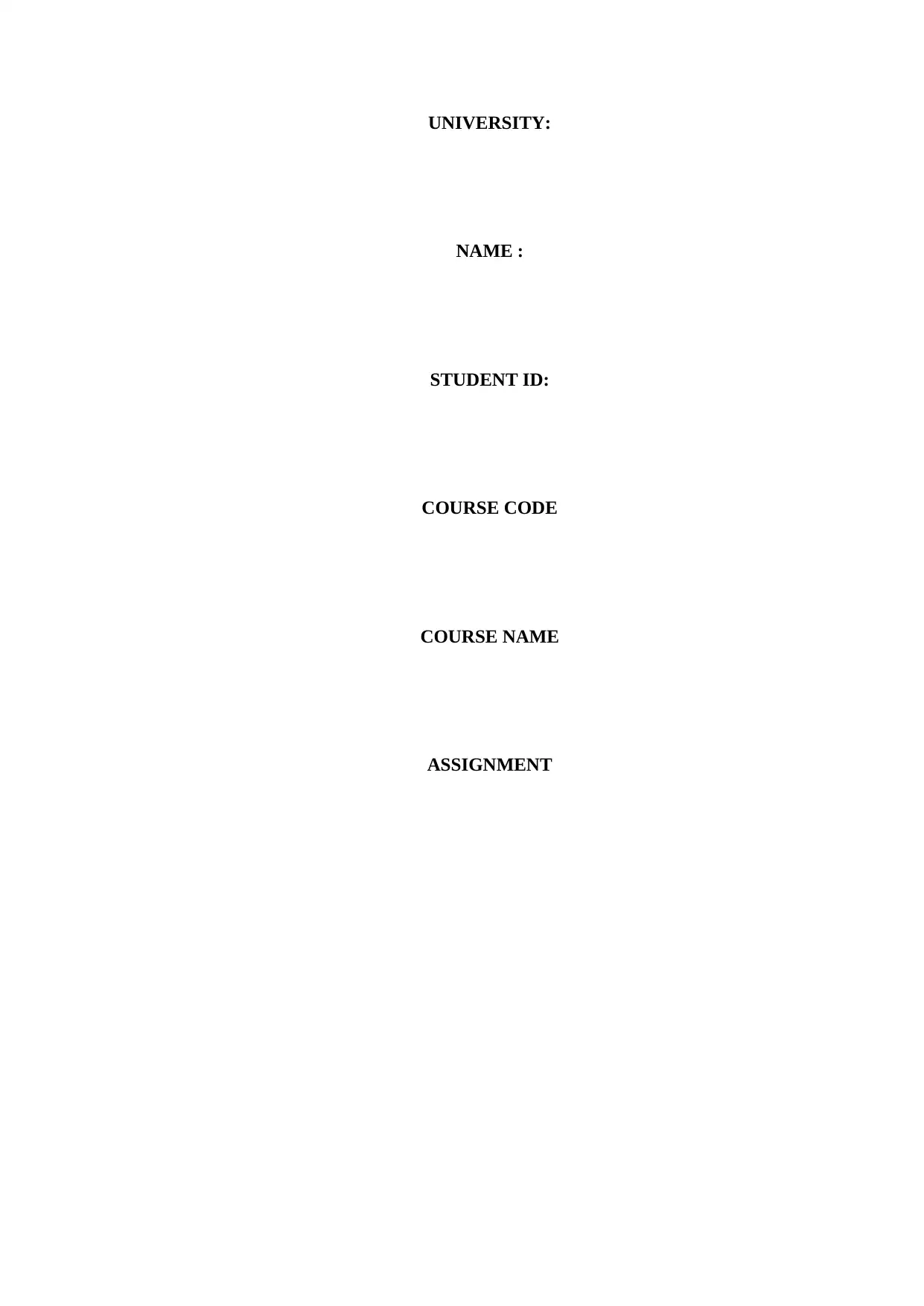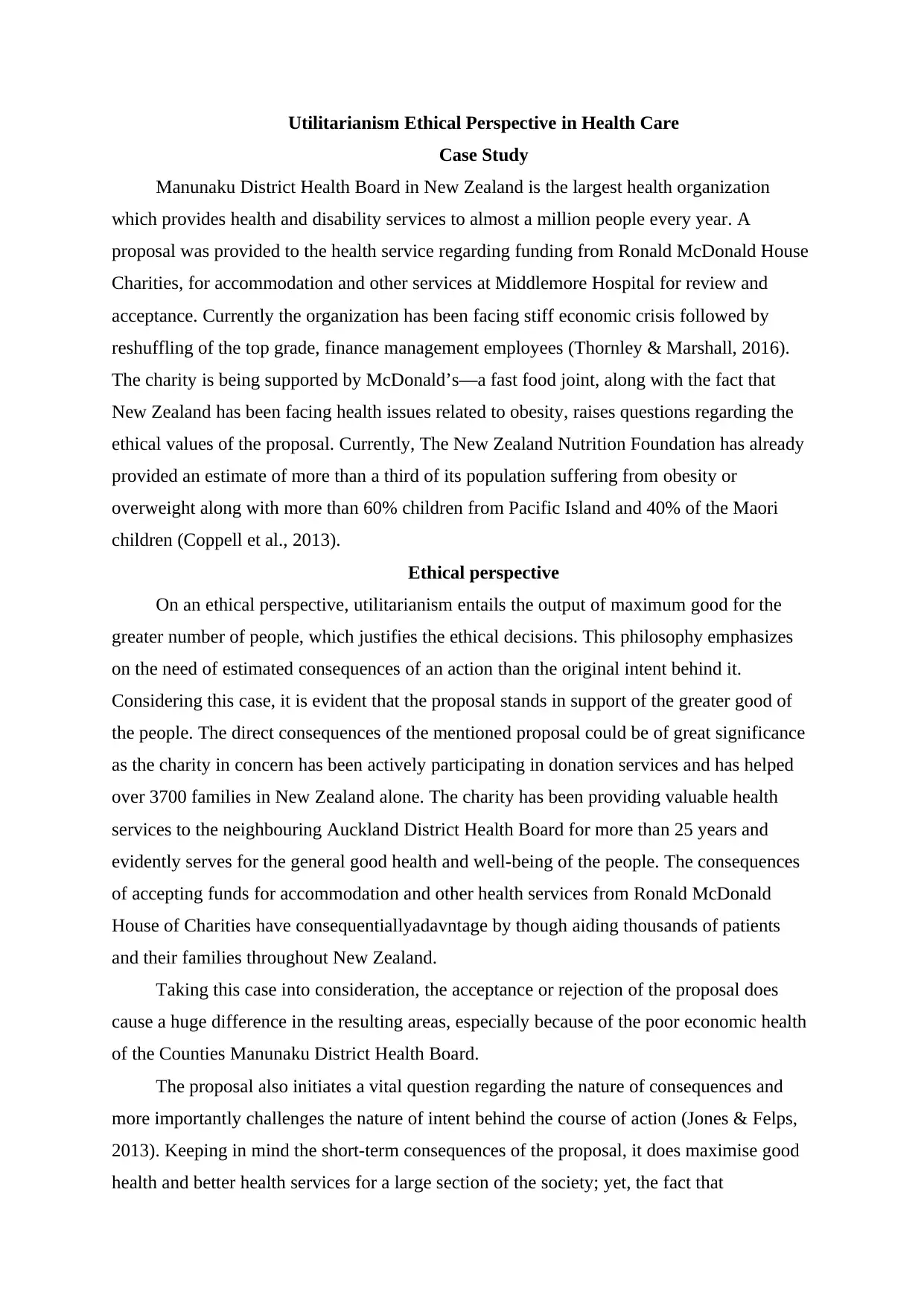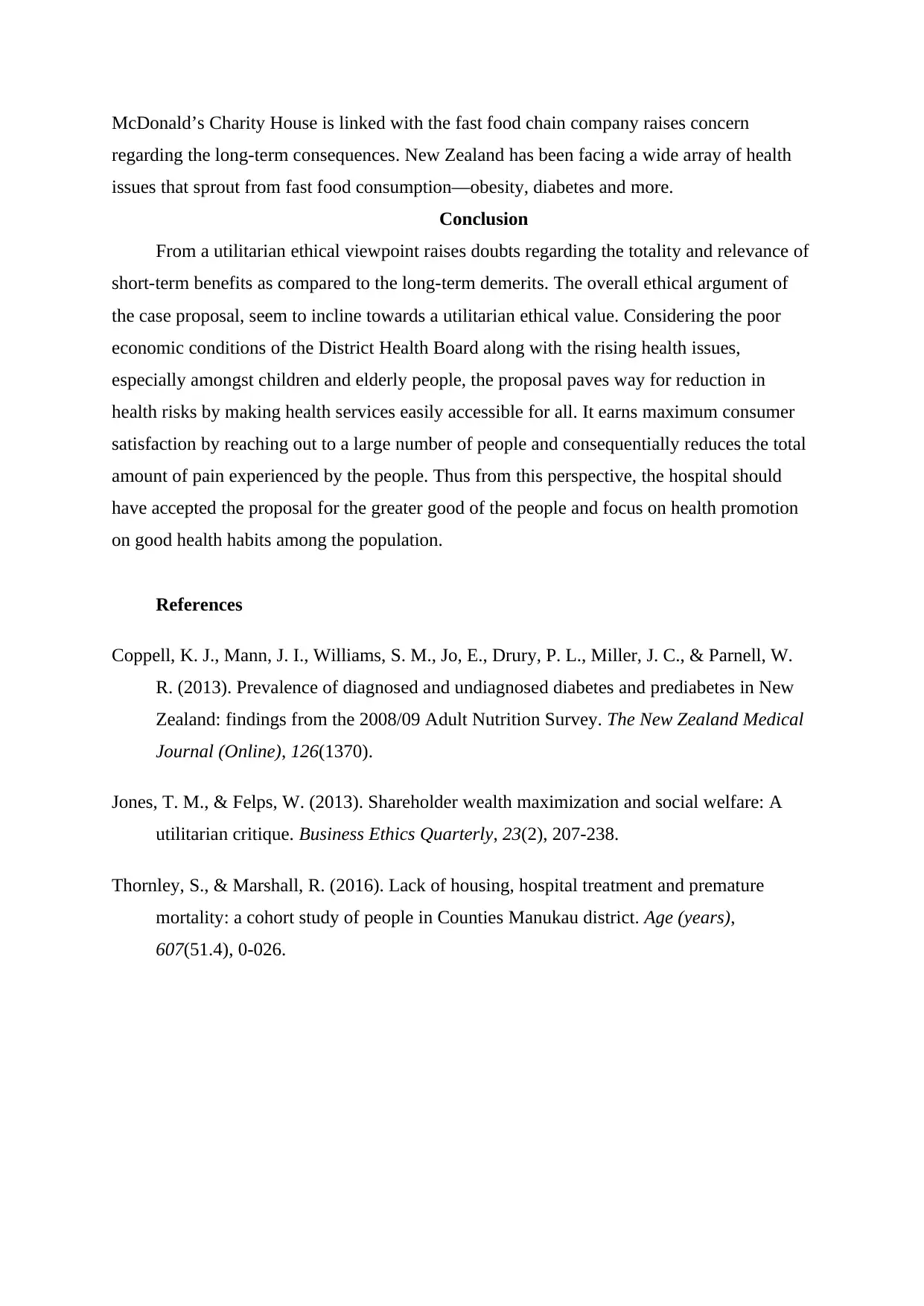Case Study: Utilitarianism Ethical Perspective in Health Care Context
VerifiedAdded on 2023/06/14
|3
|799
|461
Case Study
AI Summary
This case study examines the ethical implications of accepting funding from Ronald McDonald House Charities by the Manunaku District Health Board in New Zealand, considering the organization's financial struggles and the country's health issues related to obesity. Applying a utilitarian ethical perspective, the analysis weighs the potential benefits of improved health services against the long-term consequences of associating with a fast-food chain. The study concludes that accepting the proposal aligns with utilitarian principles by maximizing good health outcomes for a larger population, especially given the Health Board's economic constraints and the accessibility of health services.

UNIVERSITY:
NAME :
STUDENT ID:
COURSE CODE
COURSE NAME
ASSIGNMENT
NAME :
STUDENT ID:
COURSE CODE
COURSE NAME
ASSIGNMENT
Paraphrase This Document
Need a fresh take? Get an instant paraphrase of this document with our AI Paraphraser

Utilitarianism Ethical Perspective in Health Care
Case Study
Manunaku District Health Board in New Zealand is the largest health organization
which provides health and disability services to almost a million people every year. A
proposal was provided to the health service regarding funding from Ronald McDonald House
Charities, for accommodation and other services at Middlemore Hospital for review and
acceptance. Currently the organization has been facing stiff economic crisis followed by
reshuffling of the top grade, finance management employees (Thornley & Marshall, 2016).
The charity is being supported by McDonald’s—a fast food joint, along with the fact that
New Zealand has been facing health issues related to obesity, raises questions regarding the
ethical values of the proposal. Currently, The New Zealand Nutrition Foundation has already
provided an estimate of more than a third of its population suffering from obesity or
overweight along with more than 60% children from Pacific Island and 40% of the Maori
children (Coppell et al., 2013).
Ethical perspective
On an ethical perspective, utilitarianism entails the output of maximum good for the
greater number of people, which justifies the ethical decisions. This philosophy emphasizes
on the need of estimated consequences of an action than the original intent behind it.
Considering this case, it is evident that the proposal stands in support of the greater good of
the people. The direct consequences of the mentioned proposal could be of great significance
as the charity in concern has been actively participating in donation services and has helped
over 3700 families in New Zealand alone. The charity has been providing valuable health
services to the neighbouring Auckland District Health Board for more than 25 years and
evidently serves for the general good health and well-being of the people. The consequences
of accepting funds for accommodation and other health services from Ronald McDonald
House of Charities have consequentiallyadavntage by though aiding thousands of patients
and their families throughout New Zealand.
Taking this case into consideration, the acceptance or rejection of the proposal does
cause a huge difference in the resulting areas, especially because of the poor economic health
of the Counties Manunaku District Health Board.
The proposal also initiates a vital question regarding the nature of consequences and
more importantly challenges the nature of intent behind the course of action (Jones & Felps,
2013). Keeping in mind the short-term consequences of the proposal, it does maximise good
health and better health services for a large section of the society; yet, the fact that
Case Study
Manunaku District Health Board in New Zealand is the largest health organization
which provides health and disability services to almost a million people every year. A
proposal was provided to the health service regarding funding from Ronald McDonald House
Charities, for accommodation and other services at Middlemore Hospital for review and
acceptance. Currently the organization has been facing stiff economic crisis followed by
reshuffling of the top grade, finance management employees (Thornley & Marshall, 2016).
The charity is being supported by McDonald’s—a fast food joint, along with the fact that
New Zealand has been facing health issues related to obesity, raises questions regarding the
ethical values of the proposal. Currently, The New Zealand Nutrition Foundation has already
provided an estimate of more than a third of its population suffering from obesity or
overweight along with more than 60% children from Pacific Island and 40% of the Maori
children (Coppell et al., 2013).
Ethical perspective
On an ethical perspective, utilitarianism entails the output of maximum good for the
greater number of people, which justifies the ethical decisions. This philosophy emphasizes
on the need of estimated consequences of an action than the original intent behind it.
Considering this case, it is evident that the proposal stands in support of the greater good of
the people. The direct consequences of the mentioned proposal could be of great significance
as the charity in concern has been actively participating in donation services and has helped
over 3700 families in New Zealand alone. The charity has been providing valuable health
services to the neighbouring Auckland District Health Board for more than 25 years and
evidently serves for the general good health and well-being of the people. The consequences
of accepting funds for accommodation and other health services from Ronald McDonald
House of Charities have consequentiallyadavntage by though aiding thousands of patients
and their families throughout New Zealand.
Taking this case into consideration, the acceptance or rejection of the proposal does
cause a huge difference in the resulting areas, especially because of the poor economic health
of the Counties Manunaku District Health Board.
The proposal also initiates a vital question regarding the nature of consequences and
more importantly challenges the nature of intent behind the course of action (Jones & Felps,
2013). Keeping in mind the short-term consequences of the proposal, it does maximise good
health and better health services for a large section of the society; yet, the fact that

McDonald’s Charity House is linked with the fast food chain company raises concern
regarding the long-term consequences. New Zealand has been facing a wide array of health
issues that sprout from fast food consumption—obesity, diabetes and more.
Conclusion
From a utilitarian ethical viewpoint raises doubts regarding the totality and relevance of
short-term benefits as compared to the long-term demerits. The overall ethical argument of
the case proposal, seem to incline towards a utilitarian ethical value. Considering the poor
economic conditions of the District Health Board along with the rising health issues,
especially amongst children and elderly people, the proposal paves way for reduction in
health risks by making health services easily accessible for all. It earns maximum consumer
satisfaction by reaching out to a large number of people and consequentially reduces the total
amount of pain experienced by the people. Thus from this perspective, the hospital should
have accepted the proposal for the greater good of the people and focus on health promotion
on good health habits among the population.
References
Coppell, K. J., Mann, J. I., Williams, S. M., Jo, E., Drury, P. L., Miller, J. C., & Parnell, W.
R. (2013). Prevalence of diagnosed and undiagnosed diabetes and prediabetes in New
Zealand: findings from the 2008/09 Adult Nutrition Survey. The New Zealand Medical
Journal (Online), 126(1370).
Jones, T. M., & Felps, W. (2013). Shareholder wealth maximization and social welfare: A
utilitarian critique. Business Ethics Quarterly, 23(2), 207-238.
Thornley, S., & Marshall, R. (2016). Lack of housing, hospital treatment and premature
mortality: a cohort study of people in Counties Manukau district. Age (years),
607(51.4), 0-026.
regarding the long-term consequences. New Zealand has been facing a wide array of health
issues that sprout from fast food consumption—obesity, diabetes and more.
Conclusion
From a utilitarian ethical viewpoint raises doubts regarding the totality and relevance of
short-term benefits as compared to the long-term demerits. The overall ethical argument of
the case proposal, seem to incline towards a utilitarian ethical value. Considering the poor
economic conditions of the District Health Board along with the rising health issues,
especially amongst children and elderly people, the proposal paves way for reduction in
health risks by making health services easily accessible for all. It earns maximum consumer
satisfaction by reaching out to a large number of people and consequentially reduces the total
amount of pain experienced by the people. Thus from this perspective, the hospital should
have accepted the proposal for the greater good of the people and focus on health promotion
on good health habits among the population.
References
Coppell, K. J., Mann, J. I., Williams, S. M., Jo, E., Drury, P. L., Miller, J. C., & Parnell, W.
R. (2013). Prevalence of diagnosed and undiagnosed diabetes and prediabetes in New
Zealand: findings from the 2008/09 Adult Nutrition Survey. The New Zealand Medical
Journal (Online), 126(1370).
Jones, T. M., & Felps, W. (2013). Shareholder wealth maximization and social welfare: A
utilitarian critique. Business Ethics Quarterly, 23(2), 207-238.
Thornley, S., & Marshall, R. (2016). Lack of housing, hospital treatment and premature
mortality: a cohort study of people in Counties Manukau district. Age (years),
607(51.4), 0-026.
⊘ This is a preview!⊘
Do you want full access?
Subscribe today to unlock all pages.

Trusted by 1+ million students worldwide
1 out of 3
Related Documents
Your All-in-One AI-Powered Toolkit for Academic Success.
+13062052269
info@desklib.com
Available 24*7 on WhatsApp / Email
![[object Object]](/_next/static/media/star-bottom.7253800d.svg)
Unlock your academic potential
Copyright © 2020–2026 A2Z Services. All Rights Reserved. Developed and managed by ZUCOL.



